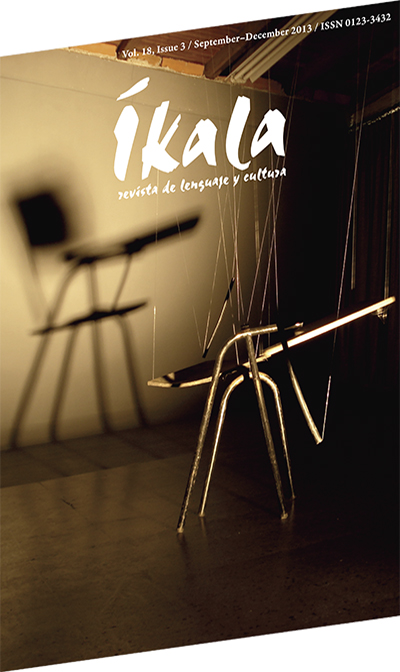Developing Writing Through Blogs and Peer Feedback
DOI:
https://doi.org/10.17533/udea.ikala.16196Keywords:
peer feedback, coherence, writing, information technology, teacher educationAbstract
Results are presented from a study conducted online with a population of students of an English teacher education program. The study inquired into the role that peer feedback played in the development or maintenance of coherence in non-fictional narrative blog writing. Participant students produced narrative blog entries and peer feedback, which were double-assessed to establish the possible relationship between feedback and coherence. Learner's logs were also kept to obtain second-order data. Findings suggest that peer-feedback and blogging can act as boosting factors to enhance or maintain levels of coherence in text, through the shaping of students' cognition and affection. The potential is revealed of student-centered strategies to enhance learning and foster autonomy through a higher degree of student's control over learning. In addition, it is proposed that new language assessment paradigms be applied in the classroom, acknowledging students as a valid and reliable source of assessment information.
Downloads
References
Boud, D. (2001). Using journal writing to enhance reflective practice. New Directions in Adult and Continuing Education 90, 9–18.
Brookhart, S. M. (2008). How to Give Effective Feedback to Your Students. Virginia, VA: Association for Supervision & Curriculum Development.
Brown, H. D. (2007). Principles of Language Learning and Teaching. New York, NY: Longman.
Burns, A. (1999). Collaborative Action Research for English Language Teachers. Cambridge, United Kingdom: CUP
Carney, N. (2007, March) Language study through blog exchanges. Paper presented at the 2nd International Wireless Ready Symposium: Podcasting Education and Mobile Assisted Language Learning. Nagoya University of Commerce & Business Graduate School, Nagoya, Japan. Retrieved from http://wirelessready.nucba.ac.jp/eproceedings.html
Clavijo Olarte, A., Hine, N., & Quintero, L. M. (2008). The Virtual Forum as an Alternative Way to Enhance Foreign Language Learning. PROFILE Issues in Teachers' professional development Journal, 9, pp. 219–236.
Demopoulos, T. (2006). What No One Ever Tells You about Blogging and Podcasting : Real-Life Advice from 101 People Who Successfully Leverage the Power of the Blogosphere. Illinois, IL: Dearborn Trade, A Kaplan Professional Company.
Díaz, N. M. (2010). Peer editing: A strategic source in EFL students' writing process. Colombian Applied Linguistics Journal 12(1), 85–98.
Ducate, L. C., & Lomicka, L. L. (2008). Adventures in the blogosphere: From blog readers to blog writers. Computer Assisted Language Learning, 21(1), 9–28.
Escuela de Idiomas – Universidad Industrial de Santander. (2009). Licenciatura en Inglés – Plan de Reforma Académica. Bucaramanga, Colombia.
Flower, L., & Hayes, J. R. (1981). A cognitive process theory of writing. College Composition and Communication, 32(4), 365–387.
Freeman, D. (1998). Doing Teacher Research: From Inquiry to Understanding. Toronto, Canada: Heinle & Heinle Publishers.
Hyland, K. (2009). Teaching and Researching Writing. Essex, United Kingdom: Pearson Education Limited.
Nunan, D. (1992). Research methods in language teaching. New York, NY: CUP.
Nunan, D. (2007). What is this Thing Called Language. Hampshire, United Kingdom: Palgrave Macmillan.
Quintero, L. (2008). Blogging: A way to foster EFL writing. Colombian Applied Linguistics Journal, 1(10), 7–49.
Richards, J. C., & Schmidt, R. (2002). Longman Dictionary of Language Teaching and Applied Linguistics. Essex, United Kingdom: Longman.
Robertson, J. (2011). The educational affordances of blogs for self-directed learning. Computers & Education, 57(2), 1628–1644.
Sagor, R. (1993). How to Conduct Collaborative Action Research. Alexandria, VA: Association for Supervision & Curriculum Development.
Vigil, N., & Oller, J. (1976). Rule fossilization: A tentative model. Language Learning, 26, 281–195
Zhang, D. (2009) The application of blogs in English writing. Journal of Cambridge Studies, 4(1), pp. 64–72.
Downloads
Published
How to Cite
Issue
Section
License
Copyright (c) 2013 Íkala, Revista de Lenguaje y Cultura

This work is licensed under a Creative Commons Attribution-NonCommercial-ShareAlike 4.0 International License.












